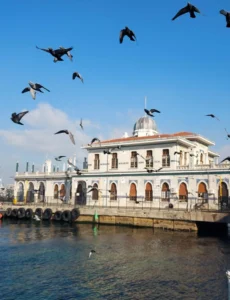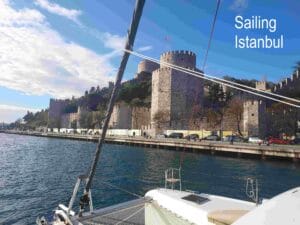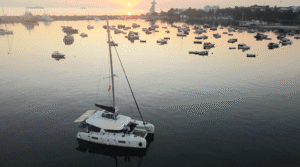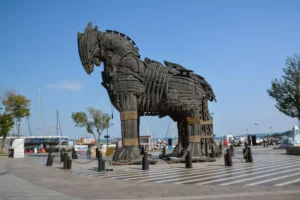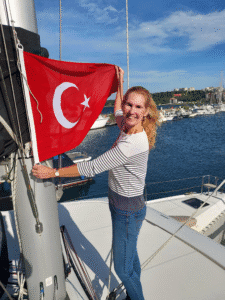When you are sailing, you meet locals and other sailors with whom you can have a wonderful time, because you have time and have an open mind towards new experiences. And especially with sailors you have so much in common: the love for water and travelling, the thirst for adventure and freedom, the positive attitude, because you have to arrange things and rely on yourself. Sometimes a meeting is short, for instance chatting for 1 hour or having a drink in the afternoon. And sometimes, you connect so well with sailors, you meet several times. You get to know each other well, share stories, and sometimes have open and deep conversations. Because there are no strings attached and you can learn from each other because you have the same spirit and unique way of living!
A nice longer time spend is what happened to us and the English family who sailed ‘Chastanet’. We met them in the bay of Alvor and spend 4 days together. We had a great time, shared a lot of sailing and family stories during that time and also had quite some remarkable experiences together as well!
How we met: saving a drifting boat!
I mentioned in our last blog, that we really like the bay of Alvor and are here now for a few weeks, because we got a good spot in the small fishing harbor. One morning I got up and looked in the direction of the Nature reserve and the little beach in front of us. The tide was low (every 6 hours, the water differs about 3 meters here, because of the influence of the Atlantic ocean) and I saw a blue/white boat on the beach. I was not sure if it was the intention of the owner to have that boat ‘falling dry’ on that beach, because the boat heeled over a lot laying on its side. It looked more like it got stranded here. Our ‘neighbor’ boat behind us at the jetty was checking the outer hull of his boat. He came to us and asked: ‘Did you have any damage on your boat, because of that boat that got dislodged from it’s mooringball last night and drifted along our boats to that beach?’. Wow, so that is what happened! We never felt anything hitting us during the night and also did not see any damage.

But what to do now? Because there was no owner of the aground boat to be seen and in 6 hours the tide would cause high water again, making the stranded boat come loose and start drifting again. Maybe hitting us and other boats. We went to the harbor office. They said it was not a client of theirs, this boat had been laying outside their harbor on a mooringball at it’s own risk. The harbormaster told us that this happened a lot: an owner was not on his boat (for months!) and with strong wind, sometimes boats started drifting.
Ok. We left the harbor office. With still the possibility of this boat hitting us and other boats. So, like many times during our 1,5 year worldtrip, we have to take matters into our own hands, no one else is going to do it otherwise.
First we walked to the stranded boat, to check if there really was no owner or a telephone number visible. The boat was locked, the name was ‘Pirata azul‘ and it said ‘Den Haag’ (The Hague) as their homeport which is in the Netherlands. But we already knew, many Portuguese boats get registered in other countries that have a less strict policy than Portugal. So probably these were not Dutch owners.
Online we could not find any information about the boat. We heard the bilge pump working inside of the boat, so water must have come in. We also saw the cause of the drifting: a pin of a shackle was missing that would have hold the boat fastened to the mooringball. We still did not know where the boat originally was situated, at what mooring ball, because there were about 20 places the boat could have been moored.


Back on our catamaran, we decided to wait for high water, see what would happen to the boat and then take action. While waiting, we saw a dinghy coming towards us and an English family friendly said ‘hi’. They were Peter, Katherine, their daughter Anneliese and son in law George. They had been checking out the stranded boat as well, because they have had the same type of boat for years (a ballad) and all of a sudden they had seen this boat stranded.
So Gilles offered to go on our 6 person dinghy to tow the boat back to it’s mooringball together with the English family. With a new shackle and extra tie raps, the boat got secured to it’s mooringball again. The owner will never know that his/her boat made this adventure! Maybe wondering what these tie raps were doing at his shackle…!


Having drinks and dinner
After this towing-adventure, we invited the family for a drink and snacks that afternoon on our boat. Because Anneliese and George mentioned that they had never been on a catamaran and were curious to find out what it looked like. We had a nice time with them! We also told them that we had saved a boat called Silbo before in the North of Spain. They had done this also, several times!
We laughed about the differences between English and Dutch, for instance when we serve ‘Gin & Tonic’ (which we usually turn into 1 word: gintonic), we just poor gin and tonic in a glass. They invited us over the next day for dinner on their ship, and they ask what kind of Gin and what kind of Tonic we would like. For each we could choose 3 different flavors. Apparently in England, they have a far more refined way of serving this drink than we Dutchies do!
Their ship was a Swan 43, they found online in Hawaii about 20 years ago. They flew there, bought the ship which is traditionally more of a racing ship than a cruise ship. So they redecorated the ship themselves and sailed her back to Cornwall, Great Britain where they live nowadays.
After a lovely dinner on their boat, we treated the English family for dinner the next day, because we still had such lovely conversations with them! They have been sailing their whole lives and Anneliese who is now in her late 20s, had been on boats since she was a baby. So what cycling is to us Dutchies, is sailing for her. It goes very naturally.
We sometimes joke to fellow-sailors we meet that we consider them ‘real’ sailors, because we only have our catamaran for ‘just’ 3 years and never sailed before. But they often reply to us, that in our last 1,5 year on our worldtrip, we have been sailing over 6.000 seamiles, in different waters (North Sea, Atlantic ocean), which is far more than most sailors have done and will do in their lives, mostly sailing in the surroundings of their own residence or own country!
Sailing a monohull for the first time
Peter asked us what we thought were the differences between monohull sailing and catamaran sailing. We told him we never had been sailing on a monohull…So he invited us to go sailing with his family the next day, because they were leaving for Portimão to stay there a few days and then leave their ship in the harbor to fly back to England. They will return to the Algarve in the spring of 2023.
We were very happy with his offer, because we were curious ourselves to experience monohull sailing.
It would turn out a lovely day, with sailing, anchoring, having a great lunch on their ship and really getting to know their monohull and what is was like to sail such ship. The differences to us, were more movements sideways, but also being closer to the water. When you are on a catamaran, you are more a ‘captain’, steering the boat from a separated hut (helm). We experienced less room to walk over the deck, because obviously it was half the size of our ship and you had to step over lines, hatches, roller rails, etc. And when the sail was raised, there were a lot more actions involved like fasten lines, loosen lines, tie knots. We do a lot of handling on our catamaran with electric winches.



So the conclusion was, monohull sailing is more sportive than catamaran sailing and when you live on a ship like we do, when usually 18 out of 24 hours you lay still, a catamaran is more comfortable.
We had taken our e-bike and roller aboard (enough place for that on the Swan 43!) and after a warm goodbye, we cycled the half hour back from Portimão to Alvor. Leaving this friendly and hospitable English family to enjoy their days in Portimão and who knows, we’ll meet them again next year or the year after in the Mediterranean!

